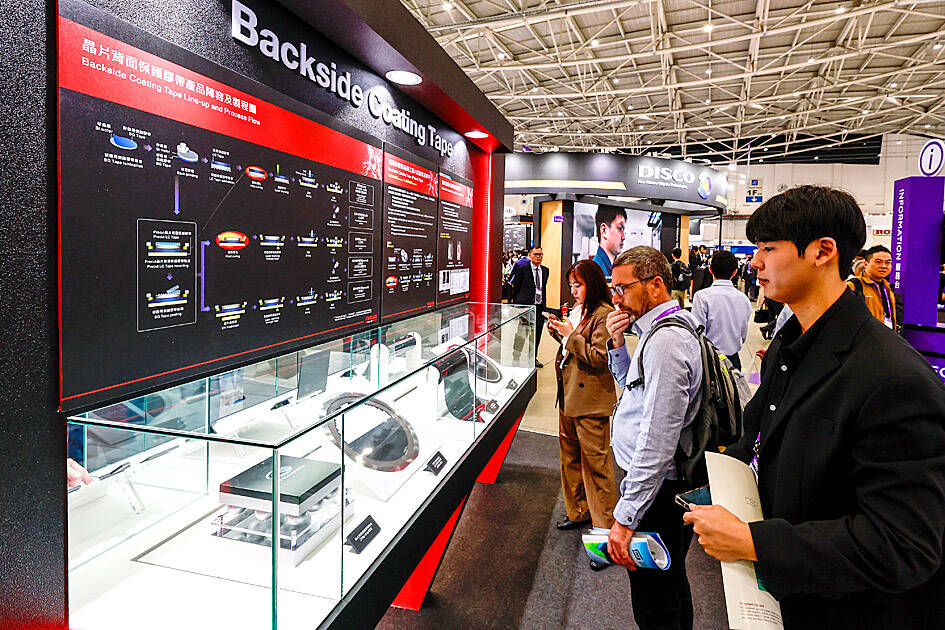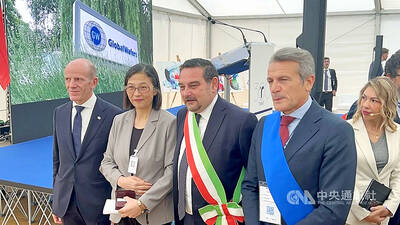Washington’s idea of a "50-50" split in semiconductor production between Taiwan and the US is "highly unlikely" to be achieved within the next three years, tech experts said on Monday.
Stephen Ezell, vice president for global innovation policy at the Information Technology and Innovation Foundation, told CNA that Taiwan makes 5.7 million wafers per month and the US only made 1.12 million in 2022, meaning the 50-50 goal is unlikely by the end of US President Donald Trump’s term in 2028.
With the CHIPS and Science Act in effect, the US is "poised to increase its global share of semiconductor capacity from 10 percent in 2022 to possibly as much as 20 percent by the end of this decade," which is close to 3.4 million per month, Ezell said.

Photo: Ritchie B. Tongo, EPA
But "even that would be less than where Taiwan stands today," he added.
On Sunday, US Secretary of Commerce Howard Lutnick told NewsNation that the 50-50 split has been proposed to Taiwan and was central to the Trump administration’s strategy.
"So the idea that I pitched them [Taiwan] was, let’s get to 50-50. We’re producing half, and you’re producing half," Lutnick said in an interview.
"Now you can imagine when someone has 95 percent convincing them that they should only have 50 percent, that’s a lot of talking, but you can tell...I’m not really shy about talking."
It was not exactly clear if the production Lutnick was referring to was Taiwan’s overall production or just that geared toward the US market.
In the same interview, he said: "When I walked into this department, the United States of America had 2 percent of the market. We were producing 2 percent of the chips we need. And my objective when I leave is 40 percent," he said, before then suggesting 50 percent.
In response to Taiwan’s concerns that the split would weaken Taiwan’s "silicon shield," Lutnick said ample US chip supply was necessary to protect Taiwan.
Ezell agreed with Lutnick that the US needed a "robust and diverse capacity in semiconductor manufacturing," since "virtually every high tech industry... depends on semiconductors as a critical input."
If Taiwan’s supply were disrupted in the event of a conflict in the region, the US would need a robust capability to continue supporting fighting operations, making chip production capacity necessary for the national security of the US and defense of like-minded nations, he said.
This was the goal of the CHIPS Act, which was prompted by the global chip distribution disruption during the COVID-19 pandemic, Ezell said.
The event awakened US policy makers to the importance of sufficient domestic chip supply for its economic and security interests, he said.
Regarding the "silicon shield" concept, which sees Taiwan’s concentrated and irreplaceable chip production as a reason for the global community to maintain peace in the Taiwan Strait, Ezell said it was "legitimate."
For Taiwan, the "critical point" of the concept is being able to withstand economic and geopolitical pressure from China.
Taiwan "must foremost have a robust, high functioning, high value-added economy, and semiconductor industry" for the broader economic wealth to support its military and national security, he said.
Meanwhile, Derek Scissors, a senior fellow at the Washington-based American Enterprise Institute who focuses on the Chinese and Indian economies and on US economic relations with Asia, said "Lutnick’s stated goals cannot be achieved during President Trump’s second term."
In an email responding to a CNA query, Scissors said the US could move faster toward self-reliance if it "focused on one kind of chip first," such as three-nanometer chips, and then turn to less advanced chips later on.

RECYCLE: Taiwan would aid manufacturers in refining rare earths from discarded appliances, which would fit the nation’s circular economy goals, minister Kung said Taiwan would work with the US and Japan on a proposed cooperation initiative in response to Beijing’s newly announced rare earth export curbs, Minister of Economic Affairs Kung Ming-hsin (龔明鑫) said yesterday. China last week announced new restrictions requiring companies to obtain export licenses if their products contain more than 0.1 percent of Chinese-origin rare earths by value. US Secretary of the Treasury Scott Bessent on Wednesday responded by saying that Beijing was “unreliable” in its rare earths exports, adding that the US would “neither be commanded, nor controlled” by China, several media outlets reported. Japanese Minister of Finance Katsunobu Kato yesterday also

‘DRAMATIC AND POSITIVE’: AI growth would be better than it previously forecast and would stay robust even if the Chinese market became inaccessible for customers, it said Taiwan Semiconductor Manufacturing Co (TSMC, 台積電) yesterday raised its full-year revenue growth outlook after posting record profit for last quarter, despite growing market concern about an artificial intelligence (AI) bubble. The company said it expects revenue to expand about 35 percent year-on-year, driven mainly by faster-than-expected demand for leading-edge chips for AI applications. The world’s biggest contract chipmaker in July projected that revenue this year would expand about 30 percent in US dollar terms. The company also slightly hiked its capital expenditure for this year to US$40 billion to US$42 billion, compared with US$38 billion to US$42 billion it set previously. “AI demand actually

Jensen Huang (黃仁勳), founder and CEO of US-based artificial intelligence chip designer Nvidia Corp and Taiwan Semiconductor Manufacturing Co (TSMC, 台積電) on Friday celebrated the first Nvidia Blackwell wafer produced on US soil. Huang visited TSMC’s advanced wafer fab in the US state of Arizona and joined the Taiwanese chipmaker’s executives to witness the efforts to “build the infrastructure that powers the world’s AI factories, right here in America,” Nvidia said in a statement. At the event, Huang joined Y.L. Wang (王英郎), vice president of operations at TSMC, in signing their names on the Blackwell wafer to

Taiwan-based GlobalWafers Co., the world’s third largest silicon wafer supplier, on Wednesday opened a 12-inch silicon wafer plant in Novara, northern Italy - the country’s most advanced silicon wafer facility to date. The new plant, coded “Fab300,” was launched by GlobalWafers’ Italian subsidiary MEMC Electronics Materials S.p.A at a ceremony attended by Taiwan’s representative to Italy Vincent Tsai (蔡允中), MEMC President Marco Sciamanna and Novara Mayor Alessandro Canelli. GlobalWafers Chairwoman Doris Hsu (徐秀蘭) said the investment marked a milestone in the company’s expansion in Europe, adding that the Novara plant will be powered entirely by renewable energy - a reflection of its